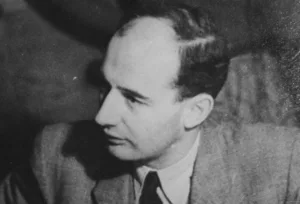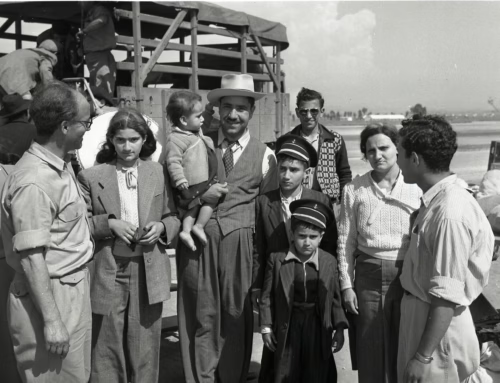Raoul’s Jewish business contacts
From the end of the 1930s until his departure to Budapest as the secretary of the Foreign Ministry’s legation in July 1944, Raoul Wallenberg’s business associates were often Jewish refugees in Sweden, in a situation where Swedish industrial organizations demanded that the National Board of Health and Welfare put a stop to fleeing Jewish businessmen at Sweden’s border – this, when parts of Europe were influenced by the Nazi boycott of Jewish businesses.

Raoul Wallenberg’s business associates were often Jewish refugees in Sweden.
For a few months in 1936, Raoul Wallenberg lived in Haifa in a Jewish colony of German Jews who’d fled the Nazi terror. It gave him an understanding and an insight into the serious situation of the Jewish population in Nazi Germany in the 1930s which wasn’t common knowledge in Sweden at that time.
He was deeply moved by their stories of systematic persecution and developed a heartfelt sympathy for the plight of the Jews. When he arrived home in Sweden, Raoul Wallenberg’s companions were therefore mostly Jewish refugees at a time when several Swedish industry organizations wrote to the National Board of Health and Welfare demanding that fleeing Jewish businessmen be stopped at the border while large parts of Europe were influenced by Nazi Germany’s boycott of Jewish goods and companies.
Ingrid Carlberg wrote in Dagens Nyheter, a major Swedish daily paper, “As early as in 1937, for example, Raoul Wallenberg became one of the Swedish partners in the German-Jewish businessman Werner Abernau’s company The Swedish-Swiss Industrial Syndicate. Swedish participation was necessary,” in connexion with the 100th anniversary in 2012 of Raoul Wallenberg’s birthday.
Swedish company complains
On January 1, 1938, a new Swedish Aliens Act came into force which provided protection for people who were fleeing for political reasons. Those who fled their country because of their race or because they “felt out of place” would no longer be considered political refugees.
In the fall of 1937, the foreign department at the Swedish National Board of Health and Welfare received a complaint against Abernau. A Swedish company wanted to tip off the authorities about the “inappropriate” fact that the German citizen Abernau could live in Dalarö outside Stockholm, and manage a company in Sweden without having a residence or work permit.
On Friday 21 January 1938, two police constables were waiting at the bus stop when Werner Abernau turned up to take the afternoon bus ride to his hostel. He was taken to the police station for questioning and on 24 January the National Board of Health and Welfare decided that Abernau should be deported with immediate effect.
Werner Abernau was one of the first to be deported under the new system. So his fate was sealed.
Abernau arrived in the Netherlands but was interred at the Westerbork concentration camp and died in 1943 in the Sobibor concentration camp.
Free from concentration camp
Ingrid Carlberg describes how Raoul Wallenberg’s next Jewish business partner was released from a German concentration camp and was able to travel to Sweden partly with the assistance of Wallenberg. This occurred in late 1938 when Sweden had begun rejecting Jewish refugees from Germany who had a letter ‘J’ stamped in their German passports.
The Jewish engineer Erich Philippi was arrested by the Gestapo in Germany in 1937. Raoul Wallenberg immediately started working for his release and also founded a company in Stockholm called ‘The Special Metals Union’ to create an income for Philippi.
The Swedish pastor in Berlin, Birger Forell, immediately intervened to free Erich Philippi.
“The alarm also reached the Philippi family’s social circles in Sweden, where there were connections to Raoul Wallenberg. The 26-year-old Wallenberg was quickly sent down to Berlin to assist Birger Forell and the action was successful,” writes Ingrid Carlberg, who adds that Raoul Wallenberg helped the German engineer earn a living in Sweden.
Wallenberg researcher Susanne Berger has shown that he went in with the start-up capital (about SEK 260,000 in today’s monetary value) and registered a Swedish company which he himself owned on paper but which in practice was owned by Philippi. When the Second World War broke out, Wallenberg secured the company’s future in a series of agreements. Among other things, he waived his right to a share in the profits and donated the entire starting capital.
In 1941 Raoul Wallenberg became a business partner of Kalman Lauer, a Swedish-Hungarian Jew who, due to the anti-Semitic laws in Hungary, could no longer do business with his home country. He instead left it to Wallenberg to become the face of the business and soon Raoul was promoted to Foreign trade representative at the Central European Trading Company (Mellaneuropeiska Handelsaktiebolaget).
Raoul recommended
This collaboration would be wholly decisive for Raoul Wallenberg’s future. In November 1942 he visited Berlin on business. In February 1943 and in September–October the same year he visited Budapest. In early 1944, the American agency War Refugee Board was created to rescue Jews from the Holocaust, and the Hungarian-Jewish population soon came into focus. The War Refugee Board was looking for a Swede who could go to Budapest as a diplomat to save Jews.
Norbert Masur of the World Jewish Congress wrote a letter to the Foreign Ministry suggesting that a Swedish diplomat would be sent there. It was Norbert Masur who introduced Raoul Wallenberg to Rabbi Marcus Ehrenpreis.
The Central European Trading Company had its office at Strandvägen 7A, in the same building in Stockholm as some of the American embassy, and it was Kalman Lauer who suggested his associate for the task. The proposal was approved by both the United States, the Swedish Foreign Ministry and the Jewish congregation in Stockholm.
On 9th July 1944 Raoul Wallenberg arrived at Budapest, assigned as first secretary to the Swedish diplomatic legation in Hungary



